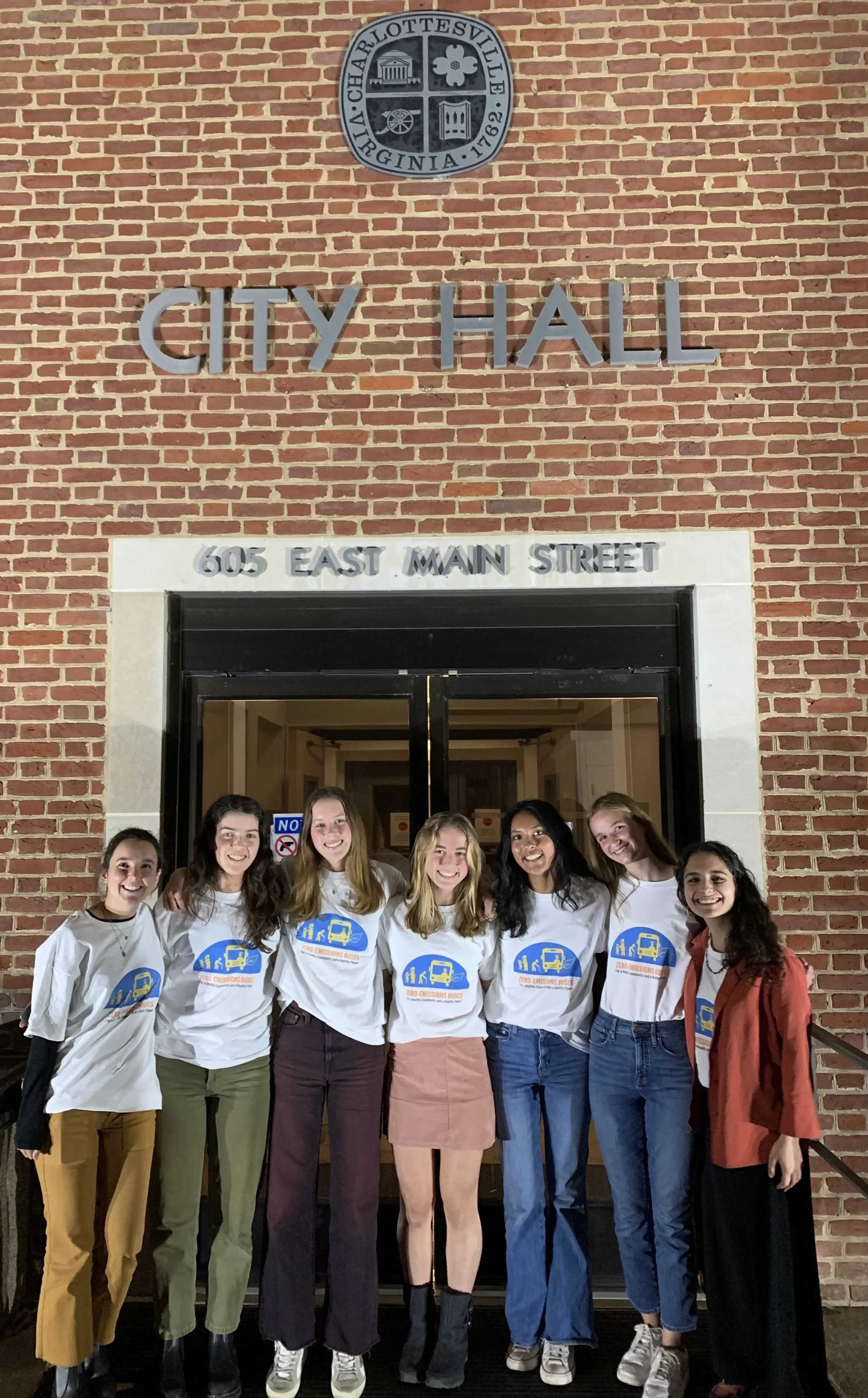Charlottesville Moves Forward with Zero-Emission Fuel Choices
Charlottesville City Council at Tuesday’s work session
On Tuesday evening, the Charlottesville City Council voiced unanimous support for moving forward with further study and planning for the adoption of zero-emission fuel types to power Charlottesville Area Transit (CAT) buses, closing the door for future tailpipe pollution-emitting fuels like diesel and compressed natural gas (CNG). This latest development in the ongoing Alternative Fuels Study process represents a major step forward for powering our city with clean, safe transportation and could not have been reached without the support of numerous partner organizations and community members.
Check out the blog post below to learn more about the latest update on the Alternative Fuels Study, why zero-emission buses (ZEBs) represent a climate justice win, and what’s next for Charlottesville transit.
What was decided by the Charlottesville City Council?
At the Alternative Fuels work session on Tuesday evening, Councillors expressed their recommendation to the Charlottesville City Manager and CAT's Director that the agency advance to the next and final part of the alternative study, aligned with the recommendations presented by Kimley-Horn in January 2024. The next phase will work on a concrete plan to integrate the new technology into the existing fleet, laying the groundwork for a full fleet transition by 2040.
Importantly, the City will move forward with battery electric buses (BEBs) and hydrogen fuel cell buses (FCEBs) - powered with either green or yellow hydrogen - as the only options for CAT's fuel transition plan. This decision rules out compressed natural gas (CNG) and FCEBs powered with blue or gray hydrogen and prioritizes alternative fuel technologies that would readily become fully decarbonized once the power grid gets cleaner. In line with this commitment, Charlottesville City Council followed staff’s recommendations and strictly instructed CAT to only explore hydrogen buses to the extent that they use hydrogen produced through electrolysis (a method that can be as clean as the electricity used to create the hydrogen).
Yesterday's recommendations will also guide CAT's Transit Strategic Plan (TSP), which is under development and will now have clear instructions to account for these recommendations as part of the capital needs for the service expansions that the agency is planning. The Council will have to adopt the TSP in FY2024 (before June 30). By doing so, the TSP will formally tell CAT and the state (VA DRPT) that the ZEB transition is officially part of its plans.
C3 staff and interns after making public comments supporting Zero Emission Buses
Why is this a climate win?
City Council’s decision puts CAT on the path to join many larger transit agencies across the country in committing to a zero-emission fleet by 2040, including the Chicago Transit Authority, New York’s MTA, and the cities of San Diego and Portland. With an adoption pace even faster than those of leading transit agencies such as Denver Regional Transportation District and Washington Metropolitan Area Transit Authority, Charlottesville’s decision represents how the city can be a model for smaller municipalities across the county that recognize the impact our transportation systems have on the environment.
As espoused in C3’s Community Letter, transportation can be a catalyst for combating climate change and has a profound impact on human and non-human health. The letter, signed by dozens of local organizations and 600+ community members, represents the community’s desire to address climate change directly and in a just, actionable way. ZEB technology is carbon neutral ready - with proper planning and investment, Charlottesville can deliver on these demands and lay the groundwork for a clean energy future for the transportation sector and beyond.
Why is this a climate justice win?
By choosing to move forward with only BEBs and FCEBs, the Charlottesville City Council has committed to powering our public transit with cleaner and safer fuel options. As C3 explored in our Alternative Fuels Study Report, these fuel types do not release harmful air pollutants; as such, they help prevent respiratory, cardiovascular, and pregnancy issues linked to inhaling pollutants from diesel and CNG/RNG buses. BEBs and FCEBs also produce significantly less greenhouse gas emissions than their diesel counterparts, with the potential for becoming carbon neutral up to 10 years before Charlottesville’s carbon-neutrality goal (provided that the power source is clean), offering a way to help the City achieve its emissions reduction goals and mitigate local impacts of climate change [1].
Moreover, the recommendations accepted by the Council include both expanding the existing fleet and transitioning to zero-emission fuel types. As discussed in a recent Op-Ed by C3’s Executive Director Susan Kruse, this holistic approach targets multiple areas of concern - access, reliability, and health - held by community members, and underscores the importance of community input throughout these processes.
What comes next?
The City will pilot BEBs this year while they work to develop plans and secure funding to house and charge a larger fleet of ZEBs. As it stands, the City would purchase its last diesel bus in 2027, with the goal of having a zero-emission fleet by as early as 2040.
While the City may be moving forward with zero-emission buses, this is not the final stop on the path to achieving the goals C3 outlined in our ACT! On Climate campaign. Creating Clean, Accessible Transportation means continuing to advocate for multi-modal transportation and equitable, transit-oriented development, all while prioritizing the most vulnerable in our communities. The City of Charlottesville has already committed to expanding the CAT fleet and compensating bus drivers fairly, two key investments for ensuring a thriving and equitable transit system. Those who ride and drive buses in our community make it better, helping us move closer to a transportation system that works for everyone.
References
[1] The Virginia Clean Economy Act (VCEA) establishes that Dominion Energy would have to provide carbon-neutral power by 2045, allowing CAT to achieve carbon neutrality by at least 2045. More info can be found here.


